Momently visible in a shower, invisible within the earth, the ministration of water is so manifest in the coming rain-cloud that the husbandman is allowed to see the rain of his own land, yet unclaimed in the arms of the rainy wind. It is an eager lien that he binds the shower withal, and the grasp of his anxiety is on the coming cloud. His sense of property takes aim and reckons distance and speed, and even as he shoots a little ahead of the equally uncertain ground-game, he knows approximately how to hit the cloud of his possession. So much is the rain bound to the earth that, unable to compel it, man has yet found a way, by lying in wait, to put his price upon it. The exhaustible cloud “outweeps its rain,” and only the inexhaustible sun seems to repeat and to enforce his cumulative fires upon every span of ground, innumerable. The rain is wasted upon the sea, but only by a fantasy can the sun’s waste be made a reproach to the ocean, the desert, or the sealed-up street. Rossetti’s “vain virtues” are the virtues of the rain, falling unfruitfully.
Baby of the cloud, rain is carried long enough within that troubled breast to make all the multitude of days unlike each other. Rain, as the end of the cloud, divides light and withholds it; in its flight warning away the sun, and in its final fall dismissing shadow. It is a threat and a reconciliation; it removes mountains compared with which the Alps are hillocks, and makes a childlike peace between opposed heights and battlements of heaven.
THE LETTERS OF MARCELINE VALMORE
“Prends garde a moi, ma fille, et couvre moi bien!” Marceline Desbordes-Valmore, writing from France to her daughter Ondine, who was delicate and chilly in London in 1841, has the same solicitous, journeying fancy as was expressed by two other women, both also Frenchwomen, and both articulate in tenderness. Eugenie de Guerin, that queen of sisters, had preceded her with her own complaint, “I have a pain in my brother’s side”; and in another age Mme. de Sevigne had suffered, in the course of long posts and through infrequent letters—a protraction of conjectured pain—within the frame of her absent daughter. She phrased her plight in much the same words, confessing the uncancelled union with her child that had effaced for her the boundaries of her personal life.
Is not what we call a life—the personal life—a separation from the universal life, a seclusion, a division, a cleft, a wound? For these women, such a severance was in part healed, made whole, closed up, and cured. Life was restored between two at a time of human-kind. Did these three women guess that their sufferings of sympathy with their children were indeed the signs of a new and universal health—the prophecy of human unity?




